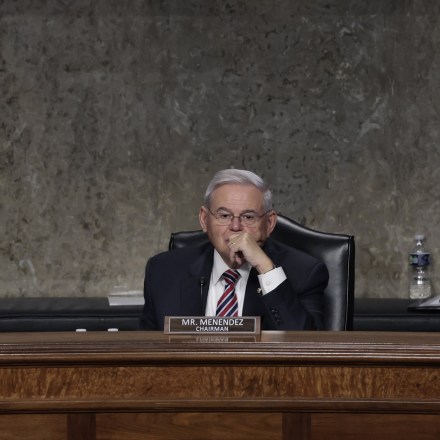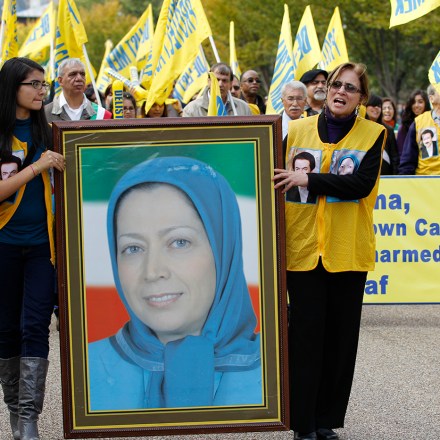Media coverage of embattled New Jersey Democratic Sen. Bob Menendez’s indictment has focused on things like gold bars and wads of cash found stuffed in his clothing — the cartoonish elements of the corruption allegations leveled by the Department of Justice.
National security experts, however, say the indictment’s reference to Egyptian intelligence officials and Menendez’s disclosure of “highly sensitive” and “non-public” information to Egyptian officials suggest that, more than a garden-variety corruption scheme, there may be an intelligence element to the charges.
Egypt’s elicitation of information resembles a textbook recruitment pass, an intelligence operation intended to recruit an asset, four former CIA officers told The Intercept.
According to the indictment, Menendez, chair of the powerful Senate Foreign Relations Committee, was sometimes asked to supply information to an Egyptian businessman who would then communicate it to Egyptian officials. The most sensitive information Menendez is accused of sharing appears to be about staffing at the U.S. Embassy in Cairo.
“The request could well be one step in testing his willingness to break rules and laws, and therefore possibly assist Egyptian intelligence in more covert and damaging ways.”
“Menendez sharing embassy staffing information is extremely troubling on a number of levels: It assists Egyptian security services monitoring the embassy and, more importantly, may suggest they viewed Menendez as a source,” said John Sipher, a retired CIA clandestine service officer and nonresident senior fellow at the Atlantic Council. “The request could well be one step in testing his willingness to break rules and laws and therefore, possibly assist Egyptian intelligence in more covert and damaging ways.”
Michael van Landingham, a former CIA analyst, told The Intercept, “Reading the indictment, it certainly appears like the Egyptian government was using a classic source-recruitment pattern to get Menendez and his wife to spy for them.”
The former officials’ remarks comes amid a report from a local New York news channel that the FBI has opened a counterintelligence investigation into Menendez. (Menendez, who plead not guilty on Wednesday, did not respond to a request for comment.)
“Senator Menendez’s chairmanship of foreign relations puts him in a bullseye position for foreign intelligence services that are looking to have him make decisions in their favor including military equipment and material decisions on funding,” Frank Figliuzzi, a former assistant director for counterintelligence at the FBI, told NBC. “All of that should be looked at from a counterintelligence perspective.” (The FBI did not respond to a request for comment.)
Since spies operate under diplomatic cover, embassies are an attractive target for intelligence services. Former CIA operations officers speaking on condition of anonymity described how recruitment passes tend to work. The requests start out small — often for information that’s not public, but not necessarily classified — in order to establish what’s called “responsiveness to tasking,” or willingness to collect intelligence on their behalf. Once responsiveness is established, a series of increasingly serious taskings culminates in a “spot payment,” or bribe, which cements the illicit nature of the relationship and can be used as blackmail.
The indictment describes Menendez meeting with the Egyptian businessman Wael Hana and, later that day, seeking nonpublic information from the State Department regarding the number and nationality of people working in the U.S. Embassy in Cairo. That information was later passed to what the indictment describes as an “Egyptian government official.” In another case, according to the indictment, Menendez’s wife Nadine, who was then his girlfriend, passed on a request from Egyptian government officials to the senator. And through Hana, Menendez was introduced to Egyptian intelligence and military officials under the auspices of increasing American food aid to Egypt.
Though not classified, the information about staffing in the U.S. Embassy in Cairo is described in the indictment as “highly sensitive because it could pose significant operational security concerns if disclosed to a foreign government or if made public.” Without notifying his personal staff, the staff of the Senate Foreign Relations Committee, which he chaired at the time, or the State Department, Menendez allegedly transmitted a detailed breakdown of the embassy staff to Nadine, who forwarded the message to Hana, who forwarded it to an Egyptian official.
“Menendez as SFRC chair would have definitely known that you shouldn’t share non-public information about something as sensitive as the make-up of an American Embassy in Cairo,” Ben Rhodes, a former top aide in President Barack Obama’s White House, told The Intercept by email. “He is supposed to oversee in part the safety of our diplomats overseas!”
Intelligence Source Recruitment
The FBI is reportedly trying to ascertain whether Egyptian intelligence played a role in the bribery scheme for which Menendez is being charged. Hana’s lawyer, Larry Lustberg, has denied that Hana is linked to Egyptian intelligence and maintains that Hana and Nadine Menendez had been friends for years. (Nadine Menendez did not respond to a request for comment.)
To the former U.S. intelligence officials that spoke with The Intercept, the events described in the indictment bear the hallmarks of an effort to recruit an intelligence source. “As an analyst, when you receive a human source report, it comes with a sourcing statement that evaluates the source’s relative position, reliability, access to information, responsiveness to tasking, and track record,” said van Landingham, the former CIA analyst.
James Lawler, a former CIA operations officer and counterproliferation chief specializing in the recruitment of former spies, similarly described the events in the indictment as fitting the pattern of source recruitment.
“As a case officer, I would be looking to establish a solid relationship with future tasking potential (i.e. going for the long play) but cognizant that it may be only a one off,” Lawler told The Intercept in an email. “That said, we’re talking about the head of the Senate Foreign Relations Committee! Talk about access! If I were the intel officer, I’d be delighted and thinking I’m going to be promoted!”
He added, “It’s how I recruited assets.”
Daniel Schuman, policy director of Demand Progress, said that overseas recruitment attempts are commonplace. For this reason, he explained, members of Congress and even congressional staffers are routinely offered counterintelligence briefings.
Menendez, in one case described in the indictment, sought to travel to Egypt unofficially and without supervision from the State Department. A trip under such circumstances runs contrary to reporting requirements under the Senate Security Manual.
The three-count federal indictment against Mendendez, unsealed on Friday, paints a damning picture of pay-to-play access with a wide cast of characters, ranging from allies of the Egyptian government to an associate of the tristate-area mob. Three business associates and Nadine Menendez are all named in the legal filing, which claims that Menendez used his position of power to influence federal appointments and protect his longtime friend, Fred Daibes, a New Jersey real estate developer, financier, and longtime Menendez fundraiser.
On Tuesday, New Jersey Gov. Phil Murphy was joined by Menendez’s fellow New Jersey Sen. Cory Booker, in calling for his resignation. “The details of the allegations against Senator Menendez are of such a nature that the faith and trust of New Jerseyans as well as those he must work with in order to be effective have been shaken to the core,” Booker said. “I believe stepping down is best for those Senator Menendez has spent his life serving.”
“Due process is a legal right, but nobody has a right to be a senator. Not being in the Senate isn’t a punishment.”
Booker’s comments follow those made by Sen. John Fetterman, D-Pa., the first Democratic senator to call for Menendez’s resignation. Fetterman said he would try to return campaign donations from Menendez in $100 bills stuffed into envelopes like those discovered in Menendez’s house by federal investigators.
Speaker Emerita Rep. Nancy Pelosi, D-Calif., called the charges against Menendez “formidable” and has said “it would probably be a good idea if he did resign.” Senate Majority Whip Dick Durbin, D-Ill., the Senate’s second-highest ranking official, has also called for Menendez to step down. Still, high-ranking officials like Senate Majority Leader Chuck Schumer, D-N.Y., have not called for his resignation. In a statement, Schumer said Menendez is “a dedicated public servant and is always fighting hard for the people of New Jersey,” adding that Menendez has a right to due process.
Schuman, of Demand Progress, pointed out that questions around Menendez’s legal proceedings are separate from questions of his position in the Senate. “Due process is a legal right, but nobody has a right to be a senator,” he said. “Not being in the Senate isn’t a punishment.”
Menendez has denied the charges, maintaining that the cash seized by authorities was from his personal savings account that he kept for emergencies “because of the history of my family facing confiscation in Cuba.” Menendez, who was born in New York City, also said, “Those behind this campaign simply cannot accept that a first-generation Latino American from humble beginnings could rise to be a U.S. senator and serve with honor and distinction.”
Update: September 27, 2023, 2:03 p.m.
This story has been updated to include a statement from former top Obama administration adviser Ben Rhodes that was received after publication.












